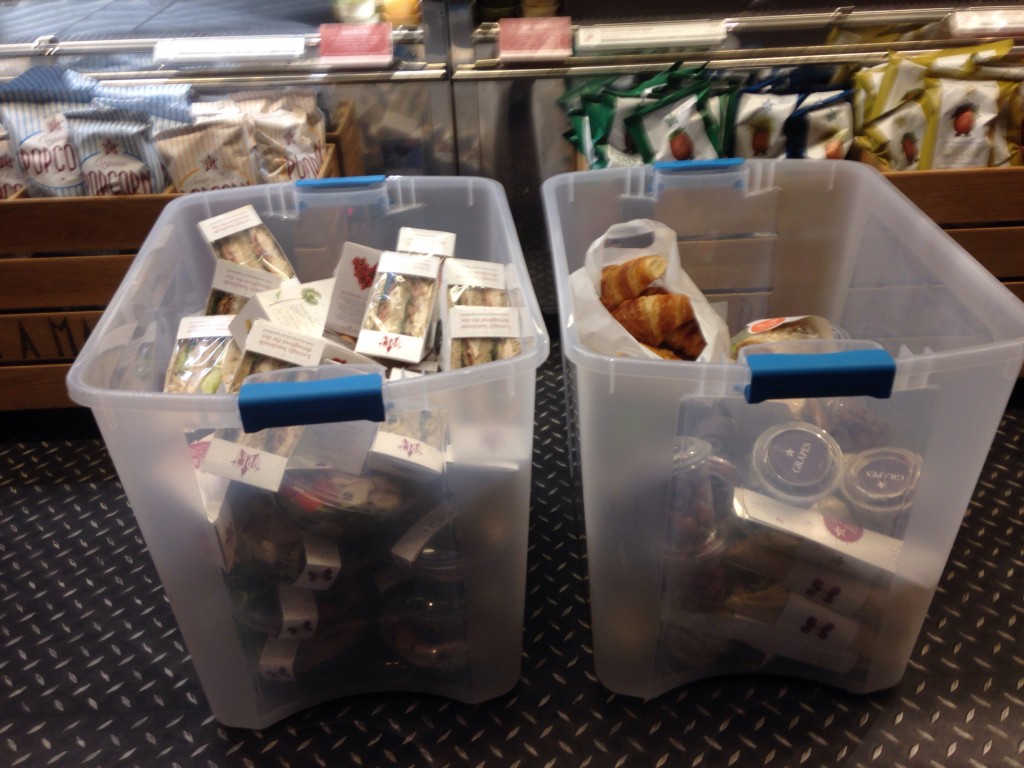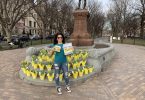By Libby Allen
BU News Service
Chris Wolfington and Lori Allen pull up to St. Francis House on Boylston Avenue. It’s just after 9 p.m. Chris’s black BMW is small but more than able to haul the two three-foot-by-four-foot tubs of leftover food to the doors of the homeless shelter. This is the first of two runs the couple will make tonight; they make these deliveries four or five times a week.
Wolfington and Allen are volunteers for a newly developed charity program in Boston called Rescuing Leftover Cuisine, which began in New York City and expanded to more than a dozen cities nationwide, including Boston this past September. RLC creates contacts with local restaurants, which agree to donate any food leftover at the close of business. So far, the Boston branch of RLC has 12 active volunteers at any given time gathering food from two different Pret-a-Manger locations.
As he drives from the St. Francis House shelter to the next Pret-a-Manger location, Wolfington describes how his involvement in RLC culminated with his interest in combatting hunger around Boston. For a couple like Chris and Lori, seeing the amount of food that would otherwise be thrown out from just two cafes every day has had a far-reaching impact on how they live their lives.

Bins of leftover food from Pret A Manger are donated to local charities through Rescuing Leftover Cuisine in Boston. (Photo: Libby Allen/BU News Service)
“The first rescue I did, I actually counted the items. It was over 250 sandwiches, about 130 salads, and 70 yogurt parfaits,” Wolfington said.
Pret-a-Manger’s philosophy is “Made today, gone today,” which may be a solid business model, but it can create staggering amounts of waste at the close of business every day.
“When you go in and you see leftover food, hundreds of sandwiches. If we weren’t here right now, this would just go right in the trash. And that, to me, is such a sobering thought. It just breaks your heart that all that good food is thrown out into the trash,” Allen said.
Wolfington described a time he was five minutes late for pick up and everything had already been thrown away.
“This is such a simple concept. You pick up excess food at the end of the day and you give it to people who need it. It’s just so simple to me,” said Kelley Garvin, the coordinating manager for the Boston RLC.
Garvin, a recent transplant from Brazil with a doctoral degree in engineering, heard about the New York City branch of RLC on CNN and reached out to the company. Her efforts spurred what is now the Boston branch of the company.
RLC seems to impact not only the shelters that benefit from its donations but the volunteers who work for it as well. All of them share one simple goal: to eliminate food waste.
“One of the things I never really understood was how far food has to travel to get from farm to table, basically. I mean, we eat apples from the grocery store that come from Chile, which doesn’t make any sense at all,” Wolfington said. “So I started thinking about all the inefficiencies in the food-supply chain and then got on the subject of the amount of food that restaurants throw away. When I saw RLC start in Boston I thought that would be a great way to contribute to this.”
The second Pret-a-Manger location that Chris and Lori collect from typically has more food for them to take; it’s a newer location that doesn’t have its product estimates narrowed down from day to day yet. Cynthia Garcia, manager of the Longwood Avenue location, says the cafe stops making pastries and sandwiches at 3 p.m. every day, and whatever is left at closing time — 10 p.m. — is either distributed to charities like RLC or thrown out.
The quantity of leftovers at the Longwood Avenue location is much more than the previous location. The two plastic bins that Chris brought to transport the food are nearly filled to the top with sandwiches and wraps encased in cellophane, salads in little plastic boxes, and yogurt parfaits. It takes two people at a time to carry one of the plastic bins to the car.
Arriving at the shelter for the second and last delivery this evening, Robert Campbell, a St. Francis House employee, greets the volunteers, deposits the food in the shelter’s kitchen and returns the plastic bins to Chris. Campbell says anywhere from 300 to 700 meals are distributed at St. Francis House daily. The shelter serves breakfast from 7:30 a.m. to 9 a.m. and lunch in the afternoon. The food is offered up cafeteria style and is supplied by donations from local charity groups like RLC.
According to statistics on RLC’s website, approximately 40 percent of losses in industrialized countries occur at the consumer retail level. Additionally, 40 percent of landfill content is food waste. Organizations like RLC are attempting to acknowledge these systemic, global problems, and are doing their best to counteract it on a localized level.
“Looking at the numbers can be daunting, but you have to start somewhere,” Garvin said.






For more information about RLC in Boston or if you interested in joining RLC in Boston’s team of volunteers, please contact us at boston@rescuingleftovercuisine.org! Volunteering can take less than 45 minutes of your time and you will be contributing to a great cause!